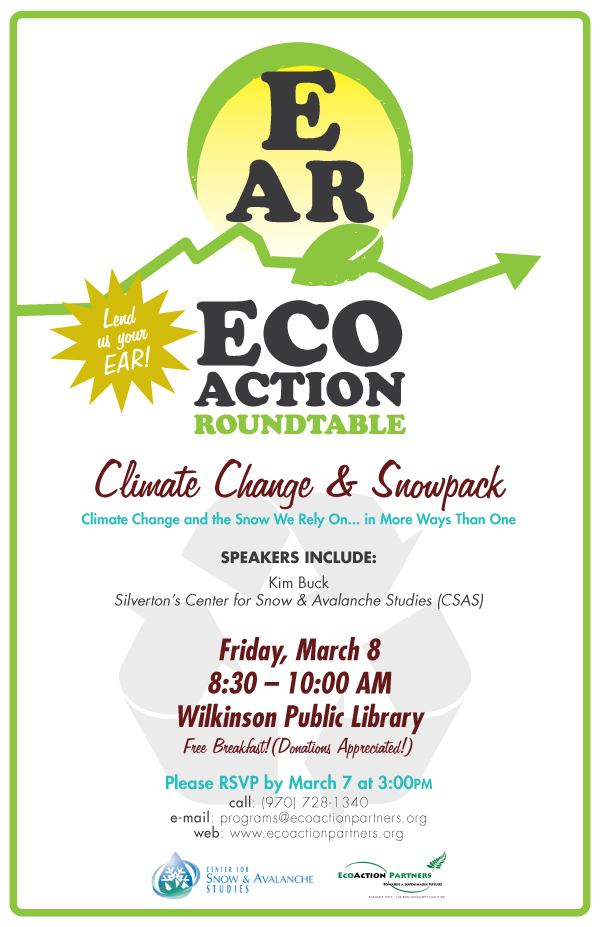
05 Mar ECOACTION TOPIC: CLIMATE CHANGE & SNOWPACK, 3/8/13
 To regions like Telluride, snow pack is more than a ski slope. The snow pack that develops here provides water throughout the summer and fall, supporting our abundant mountain ecosystems. As our climate changes and storm cycles are altered, so is the snowpack we rely on for so much more than pure recreation.
To regions like Telluride, snow pack is more than a ski slope. The snow pack that develops here provides water throughout the summer and fall, supporting our abundant mountain ecosystems. As our climate changes and storm cycles are altered, so is the snowpack we rely on for so much more than pure recreation.
On Friday, March 8, 8:30-10:30 a.m., Program Room, Wilkinson Public Library, EcoAction Partners focuses its March EAR (EcoAction Roundtable) on a topic more relevant and pressing than ever. The talk features Kim Buck of Silverton’s Center for Snow and Avalanche Studies (CSAS), serves the mountain science community and regional resource managers by hosting and conducting interdisciplinary research and integrative monitoring to capture weather, snowpack, radiation, soils, plant community, and hydrologic signals of regional climate trends.
Kim will speak on the importance of snow pack within our community and others along the Western Slope and delve into the effects of climate change on our snow. We will also have a unique opportunity to learn about the research and monitoring process CSAS employs in its unique mountain system study area. That one-of-a-kind study plot is located in Telluride’s backyard, but the data it produces is used with confidence by climate scientists around the world.
Located north of Silverton at Red Mountain Pass, CSAS 720 acre Senator Beck Basin Study Area, provides snow system research and monitoring instrumentation and programs. CSAS is also home to “CODOS”, the Colorado Dust-on-Snow program. CODOS monitors the presence/absence of dust layers at ten mountain pass locations throughout the State.
As posted on CSAS website:
“The variability of the snow resource, and the possibility that climate change could cause substantial long-term changes in the distribution of seasonal snow and other reserves of water, requires a thorough analysis of snow’s relationship to the economies of regions and enterprises that depend on snow or its runoff. Understanding the seasonal delivery and distribution of mountain snowcover, the snowpack storage and release of water, the role of ablation…, and the effects of climate on those processes, are clearly of increasing importance to the American West and to snowmelt-watered regions everywhere.”
The issue will take time to fully understand and fight. As a mountain community, we see the effects of the dust-on-snow, but may feel powerless to do anything about it since the dust in our snowpack originates out of our reach, in Texas, Arizona, New Mexico, and Utah. One key, however, may lie in spreading the habits of “holistic resource management” and sustainable interactions with our fragile landscapes.
A goal of EcoAction Partners is to promote education that leads to action. So, lend us your EAR and let’s begin the conversation about our snowpack!
“Climate Change, Snowpack, and the Western Slope” is free and includes breakfast.


Sorry, the comment form is closed at this time.